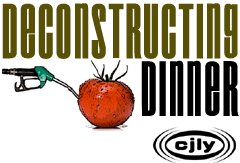
[Editor's note: This is a summary of a podcast you can download or listen to from this page.]
The diversity of the varieties of crops being grown in Canada has dwindled significantly. Most of the livestock we raise, and the fruits, vegetables and grains we grow are varieties that have been selected or bred to produce high yields and travel long distances.
Now, in the face of global food shortages and climate changes, it's more important than ever to diversify our food crops and bring choice back into the average North American's diet.
This series will explore the risks of a homogenized food system, and highlight some of the farmers and organizations that are helping to preserve Canada's heritage foods and maintain local supplies.
Part I
In part one, we resurrect Red Fife wheat, perhaps the most important wheat variety in the country. Red Fife fed Canadians for 40 years, yet has since all but disappeared as more export-oriented varieties proliferated. Now, Red Fife is making a comeback, and the Canadian Food Inspection agency doesn't like it. Is this a chance for the people of Canada to reclaim control over our cultural heritage and challenge the industrial food system? Agronomist and heritage wheat champion Sharon Rempel thinks so.
We also learn about heritage, or heirloom, vegetables. Growing heirlooms is an exciting way to try new and unusual tastes, shapes and colours. More than that, it is an effort to protect the genetic diversity of our food crops. Some varieties have disappeared forever and there is growing interest in keeping those that remain in circulation. Heirlooms, unlike some hybrids, are grown for taste - not simply the ability to withstand shipping and maintain a uniform look at market.
Audio recorded by Marinko Jareb (St. Catharines) and Andrea Langlois (Victoria)
Guests
Sharon Rempel, Agronomist, Grassroot Solutions (Victoria, B.C.) - Sharon's expertise lies in organic production, seed conservation, 'on farm' wheat breeding and heritage crops. Sharon was the founder of Seedy Saturdays - community seed exchanges held each year across the country. Sharon is the director of the Heritage Wheat Project. Her most recent project was Canada's first ever Bread and Wheat Festival, held in Victoria on October 27, 2007.
Linda Crago, farmer, Tree and Twig Heirloom Vegetable Farm (Wellandport, Ont.) - At Tree and Twig Heirloom Vegetable Farm, Linda's specialty and passion is heirloom vegetables. Linda offers a tremendous selection of heirloom tomato transplants (more than 200 varieties), heirloom pepper and eggplant transplants and more. She operates a CSA program, supplies restaurants and offers mail order across Canada. Linda organically grows more than 1,000 varieties of veggies on an intensively planted piece of land.
Music
Phil Vernon, musician, Æthm Music (Salt Spring Island, B.C.) - The broadcast marks the radio debut of "Red Fife Wheat" - a new song recorded just days before this broadcast first aired. The creator of the song is Phil Vernon, a musician based on Salt Spring Island, BC. Phil has lent his musical farming talents to the program on a number of previous occasions. Note: This recording is only a demo.
Related Tyee stories:
- 'Gardens of Destiny'
Podcast: 'Deconstructing Dinner' meets with heritage seed saver Dan Jason. - 'Zero Mile Diet' Blooms in BC
'Dramatic' rise in food gardens, say seed vendors. - The Future of Food
Podcast: Insights from conscientious cooks and food security experts.
Read more: Podcasts, Food, Deconstructing Dinner, Environment














Tyee Commenting Guidelines
Comments that violate guidelines risk being deleted, and violations may result in a temporary or permanent user ban. Maintain the spirit of good conversation to stay in the discussion.
*Please note The Tyee is not a forum for spreading misinformation about COVID-19, denying its existence or minimizing its risk to public health.
Do:
Do not: